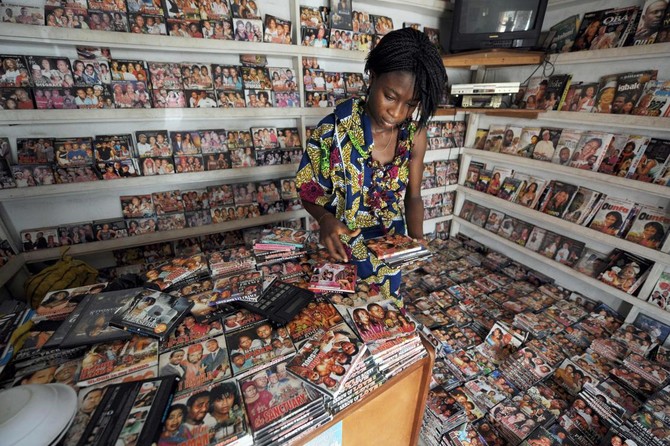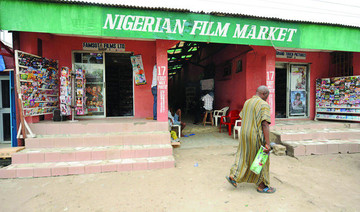LAGOS, Nigeria: A glamor blogger, a filmmaker and a tech mogul are competing to create a homegrown African rival to Netflix, but poor Internet connections and intense competition are proving daunting obstacles.
They dream of popularizing access to films made in Nigeria, which is home to the world’s second biggest movie industry in terms of production behind Hindi-language Bollywood.
With nearly $4 billion in revenue and almost 2,000 productions every year, films made in what is known as Nollywood are largely sold on the streets and to idling motorists caught in traffic as pirated copies for just a few dollars.
Local start-ups and Nollywood stars understand the interest in changing the distribution of films that are hugely popular across Africa, where cinemas are few and far between.
With such a huge potential market, video-on-demand platforms have sprung up in Lagos, Nigeria’s commercial capital and home to the country’s film industry.
And competition is already fierce.
Blogger Linda Ikeji — one of Nigeria’s biggest names on social networks — recently launched Linda Ikeji TV (LITV) to great fanfare.
It offers dozens of films, series and programs inspired by US shows but with a Nollywood twist for a monthly fee of 1,000 naira ($2.80).
“We are hoping to be to Africa what Netflix is to the world,” Ikeji wrote on her Instagram page, which has some two million followers.
She promised glamor, sass and humor, particularly with reality shows such as “Football Wives” or “Highway Girls of Eko,” “a show on real-life prostitutes” in Lagos.
The 37-year-old former model-turned-businesswoman made her fortune through advertising revenue on her site, which tracked the lives of Nigeria’s rich and famous.
She said she had invested “half-a-billion naira” of capital in the project. As well as buying video, she is also making original content from her own studios in Lagos.
Before the end of the year, Nigerian company Envivo is expected to launch its own platform with an initial investment of more than $20 million, said filmmaker Chioma Ude, who is the firm’s marketing director.
“(US telecoms giant) Cisco wants a big footprint in Africa, and as our technical partner, they will provide all the technology, from the network to the video compressions, etc.,” the founder of the Africa International Film Festival said.
A viable economic model for the promoters of Nollywood online still needs to be found, given the lack of widespread high-speed Internet coverage.
Only 34 percent of Africans have Internet access compared with more than 50 percent in the rest of the world, according to the 2018 Global Digital report.
But Africa showed the biggest progression in Internet users last year, especially through mobile telephones.
Serge Noukoue, organizer of the annual Nollywood Week in Paris, said price was everything and the African consumer wanted to pay “as little as possible” to watch a film.
“Even iROKOtv, the pioneer on the continent, doesn’t really make a profit,” he said.
“They have had a lot of success in fundraising but what subscribers actually bring in is less conclusive.”
Jason Njoku founded iROKOtv in 2010 but said he made a mistake to count on streaming from the start. “It simply couldn’t work,” he explained.
“Data costs were prohibitive, as is access to reliable broadband across huge swathes of the continent. Our customer service team was inundated with queries.
“We totally rebuilt our product and rebuilt our entire company around the African consumer and their habits.”
That led to an application that ate less data and which allows free mobile downloads of video files.
There is original content, while films have also been subtitled in French, Swahili and Zulu to make them more accessible to other African countries.
Competitors have emerged elsewhere in Africa in recent years, including Kenya’s BuniTV ($5-a-month) or South Africa’s Magic Go ($8-a-month).
“If these online platforms don’t make money yet they’re a bet on the future for when connections are better,” said Noukoue.
“A lot of projects have been created but there will not be room for everyone in the market in the long term. Competition will be fierce.”
Giants of the sector such as Netflix, which in 2016 launched in Africa, could outshine the continent’s video-on-demand pioneers in years to come.
“Netflix doesn’t yet have a real Africa strategy but it’s started to produce original African content. That will be a gamechanger.
“It has considerable means at its disposal that the others don’t have.”
Nigeria sees a rush to get Nollywood online
Nigeria sees a rush to get Nollywood online

- Nollywood is home to the world’s second biggest movie industry in terms of production behind Hindi-language Bollywood.
- A viable economic model for the promoters of Nollywood online still needs to be found, given the lack of widespread high-speed Internet coverage
Switzerland’s Nemo wins Eurovision Song Contest amid Israel controversy

MALMO/DUBAI: Switzerland's Nemo won the Eurovision Song Contest on Saturday in a competition marked by controversy over Israel's participation during the war in Gaza.
Twenty-four-year-old Nemo's "The Code" won the highest score from nations' juries, and enough of the popular votes to get 591 points, edging out Croatia in the final, held in Sweden's Malmo.
"I hope this contest can live up to its promise and continue to stand for peace and dignity for every person in this world," a teary-eyed Nemo said while receiving the trophy.
Twenty-five nations competed Saturday but much of the focus has centred on the controversy of Israel being able to take part.
When Golan went on stage to perform her "Hurricane", both cheers and boos could be heard from the audience in the Malmo Arena.
Boos could also be heard while Israel delivered its points to other acts and any time a country gave "Hurricane" high scores.
Golan finished fifth with 375 points.
Organizers had banned all flags other than those of the participating countries.
The young performer also said that the experience had been "really intense and not just pleasant all the way."
"There were a lot of things that didn't seem like it was all about love and unity and that made me really sad," Nemo told reporters.
Outside the arena, police pushed back protesters where more than a hundred demonstrators waved flags and chanted "Free Palestine".
Diverse Malmo is home to the country's largest community of Palestinian origin and according to police at least 5,000 people gathered to protest in the city in the afternoon.
The European Broadcasting Union, which oversees the event, confirmed in March that Golan would take part, despite calls for her exclusion from thousands of musicians around the world.
The same month, contestants from nine countries, including Nemo, called for a lasting ceasefire.
Irish performer ‘cries’ after Israel reaches Eurovision final as UK venues cancel watch parties

Bambie Thug, Ireland’s entry in the Eurovision Song Contest, claims to have cried after Israel qualified for the final to be held on Saturday.
“It is a complete overshadow of everything, goes against everything that Eurovision is meant to be,” Bambie Thug told journalists ahead of the event at Malmo Arena in Sweden. “I cried with my team.”
The 31-year-old singer and songwriter wore a keffiyeh and carried Irish flags while urging the European Broadcasting Union to show “conscience” and “humanity.”
The artist will perform “Doomsday Blue” in the final.
Israel’s performer, Eden Golan, will present her song “Hurricane” at the competition. The track underwent revisions after the initial version, “October Rain,” was deemed too political by the EBU.
Although the contest’s motto is “united by music,” this year’s event has attracted protests from Palestinians and their supporters, who say Israel should be excluded because of its conduct of the war in Gaza.
Thousands of people are expected to march for a second time this week through Sweden’s third-largest city, which has a large Muslim population, to demand a boycott of Israel and a ceasefire in the seven-month conflict.
In Finland, a group of about 40 protesters stormed the headquarters of public broadcaster YLE on Saturday, demanding it withdraw from the song contest because of Israel’s participation.
Venues across England are canceling their gigs after Palestine protest groups instructed their followers to pressure pubs showing the contest - leading some venues to close due to staff safety concerns.
The Duke of York cinema in Brighton called off its Eurovision event this week, telling ticket holders it was doing so “due to safety concerns for our staff and customers,” the Guardian reported. The Brighton Palestinian Solidarity Campaign called the decision a “massive win.”
AlUla to have starring role in ‘Motor City’ to be filmed in Saudi Arabia

DUBAI: Saudi Arabia’s AlUla is expected to have a starring role in director Potsy Ponciroli’s upcoming action thriller “Motor City.”
Production is due to start on July 10 in New Jersey and Saudi Arabia. The film is part of production company Stampede Ventures’ 10-picture slate deal with Film AlUla.
The cast will include Alan Ritchson, Shailene Woodley, Ben Foster and Pablo Schreiber.
“Motor City” is centered around John Miller (Ritchson), a Detroit auto worker who loses everything, including his girlfriend (Woodley), after being framed by a local gangster (Foster) and sent to prison.
After his release, Miller seeks revenge while trying to win his former girlfriend back.
Louvre Abu Dhabi to exhibit Van Gogh artwork

DUBAI: Louvre Abu Dhabi is set to display an artwork by Dutch painter Vincent van Gogh at the “Post-Impressionism: Beyond Appearances” exhibition running from Oct. 16 to Feb. 9 next year.
The work, “Bedroom in Arles,” depicts van Gogh’s bedroom in his yellow house in Arles, where he set up his studio and lived from September 1888.
The exhibition will be curated by Jean-Remi Touzet, conservator for paintings at the Musee d’Orsay, and Jerome Farigoule, chief curator at Louvre Abu Dhabi, with the support of Aisha Alahmadi, curatorial assistant at Louvre Abu Dhabi.
It will delve into the period known as post-impressionism, focusing specifically on the years between 1886 and 1905. “These two decades were a time of immense artistic innovation and experimentation, marking the transition from impressionism to the explosive emergence of the ‘fauves’ at the Salon d’Automne,” a press release said.
Highlights from the Arab world include two masterpieces by French Egyptian artist Georges Hanna Sabbagh: “The artist and his family at La Clarte” (1920) and “The Sabbaghs in Paris” (1921).
Singer Elyanna makes her TV debut on ‘The Late Show’

- Chilean Palestinian star performs hits from debut ‘Woledto’
- Proudly adorned with Palestinian keffiyeh around her head
DUBAI: Chilean Palestinian singer Elyanna made her television debut this week on “The Late Show with Stephen Colbert.”
The 22-year-old music sensation delivered a medley of hits from her debut album “Woledto,” including “Callin’ U (Tamally Maak)” and “Mama Eh,” the first song performed entirely in Arabic on the show.
Her performance featured an ensemble of oud, tabla, riq and dancers.
“I had so much fun performing on this iconic stage,” she wrote to her 1.2 million followers after her show.
The hitmaker was adorned in a white lace dress featuring two thigh-high slits. She complemented the attire with coin-belt accessories, draping them over her shoulders and fastening them around her calves to add a Middle Eastern touch to her look.
In one of the pictures she shared with her fans, she proudly wore the Palestinian keffiyeh around her head as she posed in front of “The Late Show” desk.
Elyanna dropped her album in April. It features nine songs: “Woledto,” “Ganeni,” “Calling U,” “Al Sham,” “Mama Eh,” “Kon Nafsak,” “Lel Ya Lel,” “Yabn El Eh” and “Sad in Pali.”
Before releasing the album, she wrote to her Instagram followers: “This album is the embodiment of pride to be an Arab woman, to be from Nazareth, to be from the Middle East.”
“This is the closest I’ve been to where I come from,” she added. “The only feature on my album is my grandfather.”
The Los Angeles-based singer’s music is a mix of Arabic and Western beats, which she attributes to her multicultural upbringing.
Elyanna has been normalizing Arabic lyrics in the Western world throughout her career, taking inspiration from artists including Lana Del Ray and Beyonce, as well as Middle Eastern legend Fayrouz.
In 2023, Elyanna became the first artist to perform a full set in Arabic at California’s Coachella music festival.
She embarked on a North American Tour this year, gracing stages in Dallas, Houston, Toronto, Montreal, Washington, New York, Chicago, Detroit, San Francisco and Santa Ana.











